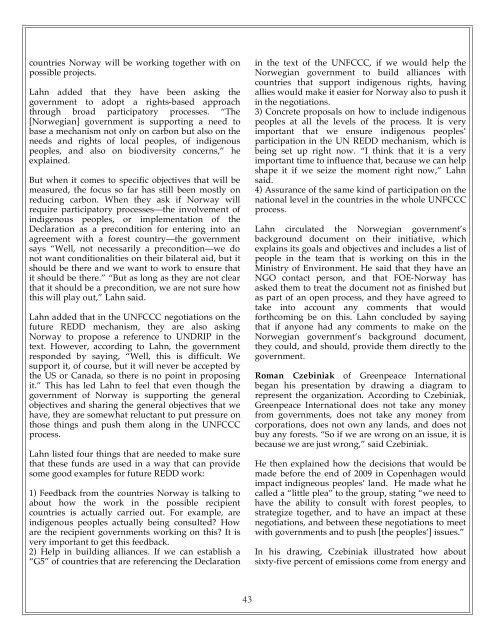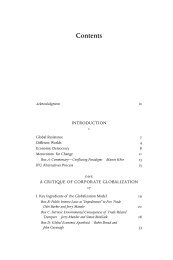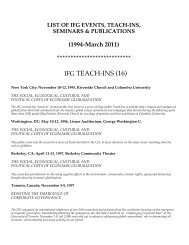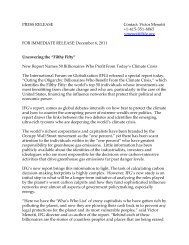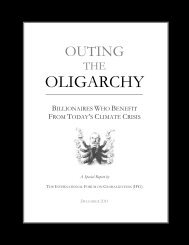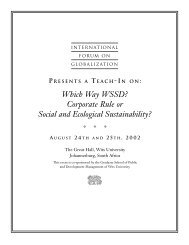UNDRIP Report - English FINAL - International Forum on Globalization
UNDRIP Report - English FINAL - International Forum on Globalization
UNDRIP Report - English FINAL - International Forum on Globalization
You also want an ePaper? Increase the reach of your titles
YUMPU automatically turns print PDFs into web optimized ePapers that Google loves.
countries Norway will be working together with <strong>on</strong><br />
possible projects.<br />
Lahn added that they have been asking the<br />
government to adopt a rights-based approach<br />
through broad participatory processes. “The<br />
[Norwegian] government is supporting a need to<br />
base a mechanism not <strong>on</strong>ly <strong>on</strong> carb<strong>on</strong> but also <strong>on</strong> the<br />
needs and rights of local peoples, of indigenous<br />
peoples, and also <strong>on</strong> biodiversity c<strong>on</strong>cerns,” he<br />
explained.<br />
But when it comes to specific objectives that will be<br />
measured, the focus so far has still been mostly <strong>on</strong><br />
reducing carb<strong>on</strong>. When they ask if Norway will<br />
require participatory processes—the involvement of<br />
indigenous peoples, or implementati<strong>on</strong> of the<br />
Declarati<strong>on</strong> as a prec<strong>on</strong>diti<strong>on</strong> for entering into an<br />
agreement with a forest country—the government<br />
says “Well, not necessarily a prec<strong>on</strong>diti<strong>on</strong>—we do<br />
not want c<strong>on</strong>diti<strong>on</strong>alities <strong>on</strong> their bilateral aid, but it<br />
should be there and we want to work to ensure that<br />
it should be there.” “But as l<strong>on</strong>g as they are not clear<br />
that it should be a prec<strong>on</strong>diti<strong>on</strong>, we are not sure how<br />
this will play out,” Lahn said.<br />
Lahn added that in the UNFCCC negotiati<strong>on</strong>s <strong>on</strong> the<br />
future REDD mechanism, they are also asking<br />
Norway to propose a reference to <str<strong>on</strong>g>UNDRIP</str<strong>on</strong>g> in the<br />
text. However, according to Lahn, the government<br />
resp<strong>on</strong>ded by saying, “Well, this is difficult. We<br />
support it, of course, but it will never be accepted by<br />
the US or Canada, so there is no point in proposing<br />
it.” This has led Lahn to feel that even though the<br />
government of Norway is supporting the general<br />
objectives and sharing the general objectives that we<br />
have, they are somewhat reluctant to put pressure <strong>on</strong><br />
those things and push them al<strong>on</strong>g in the UNFCCC<br />
process.<br />
Lahn listed four things that are needed to make sure<br />
that these funds are used in a way that can provide<br />
some good examples for future REDD work:<br />
1) Feedback from the countries Norway is talking to<br />
about how the work in the possible recipient<br />
countries is actually carried out. For example, are<br />
indigenous peoples actually being c<strong>on</strong>sulted? How<br />
are the recipient governments working <strong>on</strong> this? It is<br />
very important to get this feedback.<br />
2) Help in building alliances. If we can establish a<br />
“G5” of countries that are referencing the Declarati<strong>on</strong><br />
in the text of the UNFCCC, if we would help the<br />
Norwegian government to build alliances with<br />
countries that support indigenous rights, having<br />
allies would make it easier for Norway also to push it<br />
in the negotiati<strong>on</strong>s.<br />
3) C<strong>on</strong>crete proposals <strong>on</strong> how to include indigenous<br />
peoples at all the levels of the process. It is very<br />
important that we ensure indigenous peoples’<br />
participati<strong>on</strong> in the UN REDD mechanism, which is<br />
being set up right now. “I think that it is a very<br />
important time to influence that, because we can help<br />
shape it if we seize the moment right now,” Lahn<br />
said.<br />
4) Assurance of the same kind of participati<strong>on</strong> <strong>on</strong> the<br />
nati<strong>on</strong>al level in the countries in the whole UNFCCC<br />
process.<br />
Lahn circulated the Norwegian government’s<br />
background document <strong>on</strong> their initiative, which<br />
explains its goals and objectives and includes a list of<br />
people in the team that is working <strong>on</strong> this in the<br />
Ministry of Envir<strong>on</strong>ment. He said that they have an<br />
NGO c<strong>on</strong>tact pers<strong>on</strong>, and that FOE-Norway has<br />
asked them to treat the document not as finished but<br />
as part of an open process, and they have agreed to<br />
take into account any comments that would<br />
forthcoming be <strong>on</strong> this. Lahn c<strong>on</strong>cluded by saying<br />
that if any<strong>on</strong>e had any comments to make <strong>on</strong> the<br />
Norwegian government’s background document,<br />
they could, and should, provide them directly to the<br />
government.<br />
Roman Czebiniak of Greenpeace <str<strong>on</strong>g>Internati<strong>on</strong>al</str<strong>on</strong>g><br />
began his presentati<strong>on</strong> by drawing a diagram to<br />
represent the organizati<strong>on</strong>. According to Czebiniak,<br />
Greenpeace <str<strong>on</strong>g>Internati<strong>on</strong>al</str<strong>on</strong>g> does not take any m<strong>on</strong>ey<br />
from governments, does not take any m<strong>on</strong>ey from<br />
corporati<strong>on</strong>s, does not own any lands, and does not<br />
buy any forests. “So if we are wr<strong>on</strong>g <strong>on</strong> an issue, it is<br />
because we are just wr<strong>on</strong>g,” said Czebiniak.<br />
He then explained how the decisi<strong>on</strong>s that would be<br />
made before the end of 2009 in Copenhagen would<br />
impact indigneous peoples’ land. He made what he<br />
called a “little plea” to the group, stating “we need to<br />
have the ability to c<strong>on</strong>sult with forest peoples, to<br />
strategize together, and to have an impact at these<br />
negotiati<strong>on</strong>s, and between these negotiati<strong>on</strong>s to meet<br />
with governments and to push [the peoples’] issues.”<br />
In his drawing, Czebiniak illustrated how about<br />
sixty-five percent of emissi<strong>on</strong>s come from energy and<br />
43


